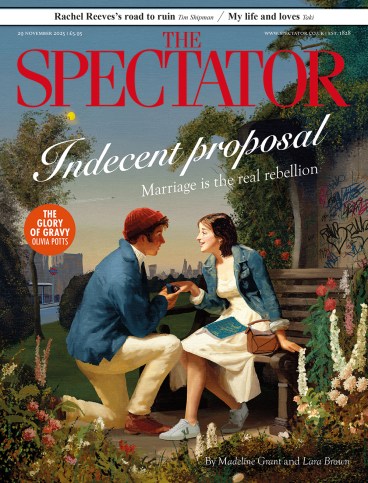
Of all Gordon Brown’s mistakes, perhaps the most sobering was his decision to end the tradition of drinking at the despatch box on Budget day. Commons convention holds that alcohol in the chamber is forbidden – with the sole exception of the chancellor when making his or her big speech. Rachel Reeves is known to like an Aperol spritz, though sadly not enough for her to restore this great custom. But we wanted to do our bit, so in protest at this abstemiousness we set ourselves a challenge: try every chancellor’s drink for which records are available, all in one sitting.
The tradition of the ‘Budget tipple’ seems to have been popularised in the 1850s, with Benjamin Disraeli. ‘Dizzy’ favoured a simple brandy and water – good for keeping one alert, warm and alive. Sensible, too, given that Disraeli delivered the longest Budget speech on record at five hours. It seemed to make sense to quaff the 11 drinks we had before us in chronological order. Big mistake. Watered-down brandy before a drinking session is no one’s idea of a sharpener.
There was no relief to follow with the second drink of our challenge. William Gladstone’s choice sounded disgusting: sherry mixed with a beaten egg. The first version we tried – sweet sherry mixed with only the yolk – produced a surprisingly pleasant crème-anglaise-style drink, not dissimilar to Tequila Rose. The second, with the white added, was revolting: a lesson in the importance of proper beating. Move on, we decided – we could never match the recipe of the Grand Old Man who had plenty of practice, delivering a record 12 Budgets.
Next came George Goschen who opted for something more familiar: port. It’s not easy to sip this without dozing off. We then skipped ahead to Winston Churchill, who liked his brandy without water. By this point we were both starting to feel it.
Churchill’s wartime colleague Hugh Dalton preferred rum and milk. There’s not much to say about this drink other than it’s quite weird. Dalton’s choice of tipple alone should have been career-ending. But what led to his resignation was his accidental leaking of some details of his speech to a journalist from the Star shortly before delivering the Budget. Reeves, take note.
Dalton was succeeded by Sir Stafford Cripps, a vegetarian teetotaller, followed by Hugh Gaitskell. His image as the ‘desiccated calculating machine’ is perhaps reflected in his choice: rum-spiked orange juice.
Thereafter, Denis Healey restored the brandy and water tradition. The times called for a stiff drink: Healey was the last chancellor to raise the basic rate of income tax and was forced to seek an IMF bailout in 1976. Healey was followed by Geoffrey Howe, who preferred the reassuringly boring Tory drink of a gin and tonic.
Next came a Spectator alumnus: Nigel Lawson. He chose wine and Malvern water, prior to renouncing alcohol in his later weight-loss book. Michael had never heard of Malvern water; James informed him it was just ‘posh water’, so we made do with what comes out of The Spectator’s taps.
The last two occupants of No. 11 to indulge in a proper Budget tipple were Norman Lamont and Ken Clarke, who enjoyed a mixture of whisky and water. The former was so reluctant to be photographed carrying a Scotch bottle into parliament that he put it in Gladstone’s famous battered red Budget box. His successor proved less reticent, with Clarke toasting a cut in spirits duty with his glass in his 1995 statement: ‘Twenty-seven pence off a bottle of whisky. I have just had the last sip of the expensive stuff.’
Finally we get to Brown, who extinguished the tradition and switched to mineral water. This move did please someone: Highland Spring issued gushing comments of approval, having plied Brown’s team with bottles of the stuff. Jeremy Hunt recently confessed that he considered drinking Welsh whisky at the despatch box – but was concerned about how it might look. Restorationist hopes could now lie with Reform UK, who would give the idea ‘serious consideration’, in the words of one senior figure.
What chancellors do still do, however, once the Budget has been delivered is decamp with their officials to The Spectator’s local, the Two Chairmen. It’s an opportunity to experience ‘the real economy’. After the Spring Statement, Reeves received a ticking-off from the pub’s bouncer for standing in the road and breaching some Westminster Council bylaw. After another Budget we witnessed inebriated Treasury staff give ‘three cheers for fiscal drag’.
Reeves cites Brown as a source of inspiration. With the state we were in by the end of our challenge, we might be taking a leaf out of his book for a while too.







Comments